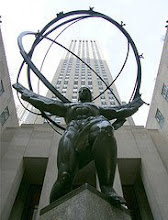
"Whether (Winston) went on with the diary, or whether he did not go on with it, made no difference. The Thought Police would get him just the same. He had committed--would still have committed, even if he had never set pen to paper--the essential crime that contained all others in itself. Thoughtcrime, they called it. Thoughtcrime was not a thing that could be concealed forever."
-George Orwell, Nineteen Eighty-Four (1949)
"This is the age of the common man, they tell us--a title which any man may claim to the extent of such distinction as he has managed not to achieve. He will rise to a rank of nobility by means of the effort he has failed to make, he will be honored for such virtue as he has not displayed, and he will be paid for the goods which he did not produce. But we--we, who must atone for the guilt of ability--we will work to support him as he orders, with his pleasure as our only reward. Since we have the most to contribute, we will have the least to say. Since we have the better capacity to think, we will not be permitted a thought of our own. We will work under directives and controls, issued by those who are incapable of working."
-Ayn Rand, Atlas Shrugged (1957)
"The year was 2081, and everybody was finally equal. They weren’t only equal before God and the law. They were equal every which way. Nobody was smarter than anybody else. Nobody was better looking than anybody else. Nobody was stronger or quicker than anybody else. All this equality was due to the 211th, 212th, and 213th Amendments to the Constitution, and to the unceasing vigilance of agents of the United States Handicapper General."
--and--
 "Hazel had a perfectly average intelligence, which meant she couldn’t think about anything except in short bursts. And George, while his intelligence was way above normal, had a little mental handicap radio in his ear. He was required by law to wear it at all times. It was tuned to a government transmitter. Every twenty seconds or so, the transmitter would send out some sharp noise to keep people like George from taking unfair advantage of their brains."
"Hazel had a perfectly average intelligence, which meant she couldn’t think about anything except in short bursts. And George, while his intelligence was way above normal, had a little mental handicap radio in his ear. He was required by law to wear it at all times. It was tuned to a government transmitter. Every twenty seconds or so, the transmitter would send out some sharp noise to keep people like George from taking unfair advantage of their brains."-Kurt Vonnegut, "Harrison Bergeron" (1961)
Meek and obedient you follow the leader
Down well trodden corridors into the valley of steel.
What a surprise!
A look of terminal shock in your eyes.
Now things are really what they seem.
No, this is not a bad dream.
-Pink Floyd, "Sheep" (1977)
...


1 comment:
Harrison Bergeron is one of my favorite short stories. Read it at IWU, "Intro to Political Theory" with Butler.
and if you haven't figured it out, this is Budny.
Post a Comment